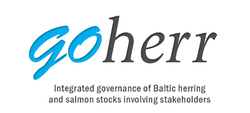Goherr: Difference between revisions
(notes moved to correct places) |
m (Internal meetings added) |
||
| Line 50: | Line 50: | ||
* [[Goherr: First International Stakeholder Workshop| 1<sup>st</sup> International Stakeholder Workshop, Feb 2016]] | * [[Goherr: First International Stakeholder Workshop| 1<sup>st</sup> International Stakeholder Workshop, Feb 2016]] | ||
* [[Goherr: Second International Stakeholder Workshop| 2<sup>nd</sup> International Stakeholder Workshop, November 2017]] | * [[Goherr: Second International Stakeholder Workshop| 2<sup>nd</sup> International Stakeholder Workshop, November 2017]] | ||
===Internal working meetings=== | |||
* [[GOHERR:Internal_meeting_of_WP_2_and_3_Oulu_020615 | Internal meeting of WP2 and WP3, June 2015 Oulu]] | |||
| style="border: 1px solid rgb(180, 180, 181); margin: 0pt 0pt 0.7em; background-color: rgb(249, 249, 253); vertical-align: top; width: 50%;padding-left:5px;padding-right:5px;" | | | style="border: 1px solid rgb(180, 180, 181); margin: 0pt 0pt 0.7em; background-color: rgb(249, 249, 253); vertical-align: top; width: 50%;padding-left:5px;padding-right:5px;" | | ||
Revision as of 05:05, 4 June 2015
Welcome to GOHERR - wikiIntegrated governance of Baltic herring and salmon stocks involving stakeholders
|
GOHERR overviewThe aim of GOHERR is to develop a novel integrated governance framework and a related decision support tool that combines the health of the Baltic Sea with the health of humans, and the dynamics of the ecosystem with human values and behaviour. By integrating the governance of two fish species and the sectoral, regional, national and sub-national as well as marine, coastal and river basin perspectives, the project aims at systematically identifying synergies or inefficiencies in the management of the socialecological system. The project will involve all stakeholders-in-chain for improving the capability of society to respond to the challenges of the Baltic Sea, from policy makers to fishermen and from scientists to consumers. The framework targets at successful implementation of ecosystem based management in the Baltic Sea, by applying and improving the tools of adaptive management and integrated management in order to enhance the coherency and efficiency of policy making and to improve the acceptability and resiliency of decisions (CEC 2008).
| ||||||||||||||||||||||||||||||||||||||||||||||||||||||||
Major meetings
Internal working meetings |
ContactsUniversity of Helsinki (UH) Coordinator: Sakari Kuikka; e-mail: sakari.kuikka(at)helsinki.fi Co-coordinator: Päivi Haapasaari, e-mail: phaapasa(at)mappi.helsinki.fi Suvi Ignatius, e-mail: suvi.ignatius(at)helsinki.fi Kirsi Hoviniemi, e-mail: kirsi.hoviniemi(at)helsinki.fi University of Oulu (UOul) Timo Karjalainen, e-mail: timopauli.karjalainen(at)oulu.fi Simo Sarkki, e-mail: simo.sarkki(at)oulu.fi Aalborg University (IFM-AAU) Alyne Delaney, e-mail: ad(at)ifm.aau.dk Swedish University of Agricultural Sciences (SLU) Anna Gårdmark, e-mail: anna.gardmark(at)slu.se Magnus Huss, e-mail: magnus.huss(at)slu.se (on parental leave until 2016) Johan Östergren, e-mail: johan.ostergren(at)slu.se Andreas Bryhn, e-mail: andreas.bryhn(at)slu.se National Institute for Health and Welfare (THL) Jouni Tuomisto, e-mail jouni.tuomisto(at)thl.fi Arja Asikainen, e-mail: arja.asikainen(at)thl.fi | ||||||||||||||||||||||||||||||||||||||||||||||||||||||||
Goherr in OpasnetOpasnet is a wiki-based website and workspace for helping societal decisions. This portal page contains a brief introduction to the topic and links to relevant pages about Goherr. The information is structured for both scientific scrutiny and for policy use at the same time. In practice, you can do original research, store data, make models, and perform policy assessments and discuss all of that work in one workspace. You can start a new assessment about a decision of your own interest, or participate in an existing assessment. Anyone can solve common problems. Opasnet is the web workspace for solving them by you, and by us together. |


